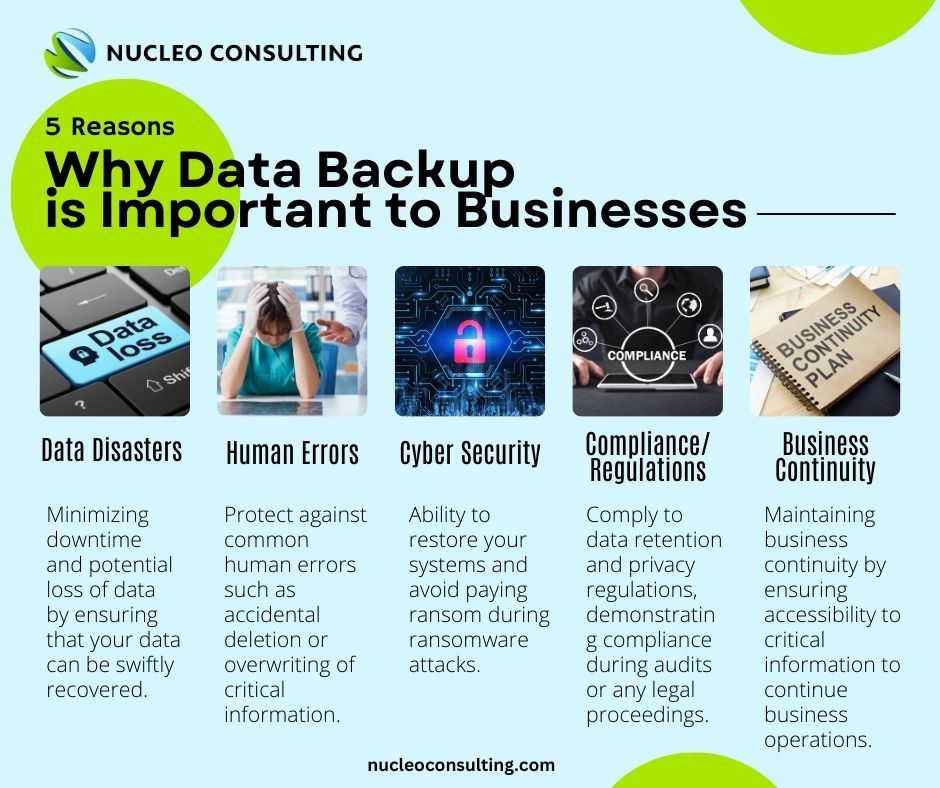In the fast-paced world of business, no business can afford to have downtime. With technology becoming an important part of every operation, data has become the golden nugget that drives decision-making and business strategies. Yet, despite the crucial role it plays, businesses often overlook the fundamental aspect that can safeguard their business success: backing up data.
In this article, we’ll shed light on the top five reasons why businesses should never underestimate the importance of data backup.

1. Data Disasters Do Happen
Picture this: you’re working on an important project that took countless hours and resources to complete. Suddenly, a power surge occurs, or a ransomware attack strikes and your precious data vanishes. It’s a nightmare no business wants to face! Such disasters are real and can strike without warning and happen to anyone. Having a robust backup system ensures that your data is safe and can be swiftly recovered, minimizing any downtime and potential losses.
2. Human Errors are Unavoidable
Let’s face it – we’re only human. Mistakes happen, even in the world of business. Accidentally deleting critical files or overwriting crucial information can send shockwaves through your operations. Without proper backup strategies, retrieving that critical data can be like searching for a tiny needle in a haystack. By regularly backing up data, you are essentially creating a safety net within your network that catches these human errors and allows you to hit the “undo” button on those unfortunate mishaps.
3. Cybersecurity is a Cat-and-Mouse Game
As businesses ramp up their cybersecurity efforts, hackers are leveling up their game too. Cyberattacks have become more sophisticated, making it increasingly important to protect your data.
Ransomware attacks, where hackers encrypt your data and demand a hefty ransom for its release, are on the rise. Having backup copies of your data means that you can tell the cybercriminals to go away, as you’ll have the upper hand and can restore your systems without giving them any ransom.
4. Compliance and Legal Requirements
Depending on your industry, you might be subject to strict data retention and privacy regulations. Failing to comply with these regulations may lead to penalties and legal consequences. Backing up your data ensures that you have a historical record of your business operations, transactions, and interactions, which can be crucial in demonstrating compliance during audits or any legal proceedings.
5. Maintaining Business Continuity
Imagine if your office is hit by a natural disaster, leaving it inaccessible for an extended period. In such situations, the ability to keep your business running depends heavily on your ability to recover and continue operations remotely. With data backed up offsite or in the cloud, your employees can access essential information and systems from anywhere, ensuring business continuity even in such situations!
In today’s data-driven world of business, overlooking data backup is like playing with fire. The destruction of data loss is a nightmare for all businesses, from financial losses to irreparable damage to your reputation. By implementing a robust data backup strategy, you’re not only protecting your business from unforeseen disasters but also fostering a culture of preparedness and resilience.
So, whether you’re a small startup or an established enterprise, take a moment to consider the critical role your data plays and the potential risks you face. Investing in a reliable data backup solution isn’t just an option; it’s absolutely necessary.
After all, in the words of Benjamin Franklin, “An ounce of prevention is worth a pound of cure.” Your data is your treasure trove and the primary key to your business operations – make sure it’s safe, secure, and always within your reach.
IT Tips | Data Protection | Cybersecurity | Data Backup | Ransomware | Data Recovery | Data Storage